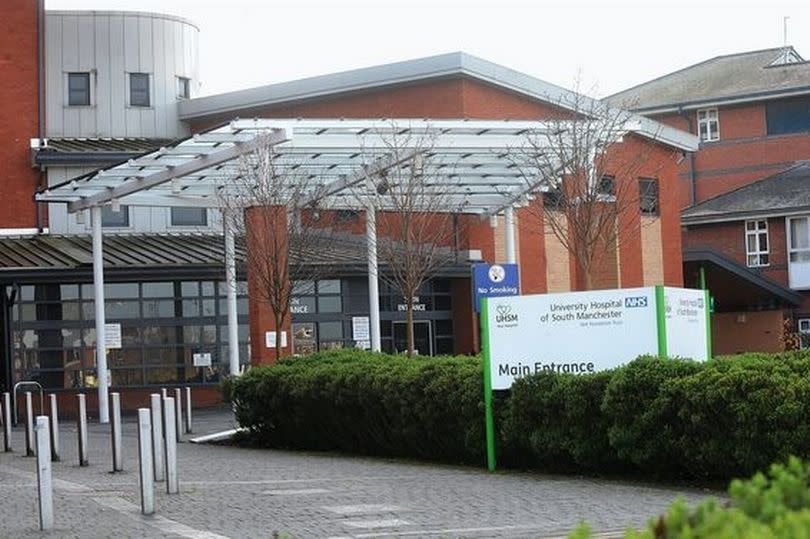Dad-to-be found dead on sofa hours before baby daughter's birth

A pregnant woman was left devastated when she discovered her partner had died on the day she was due to give birth. Rebecca Moss tried to wake Thomas Gibson, 40, with the words "Wake up, it's baby day", only to find he had diedafter doctors misread an abnormal heart scan, Stockport Coroner's Court heard.
Ms Moss attempted to administer emergency first aid before paramedics arrived and pronounced Mr Gibson dead. She later gave birth to their daughter, Harper, in hospital just hours after the tragic incident.
During the inquest into Mr Gibson's death, a hospital doctor admitted to misinterpreting an electrocardiogram (ECG) scan taken 11 days prior, when Mr Gibson had visited A&E with a severe stomach bug.
READ MORE: These are the 10 Midlands GP surgeries where it's hardest to get an appointment
Get the latest court and crime news direct via our WhatsApp community here
An emotional Ms Moss, from Stretford, Greater Manchester, recounted the heartbreaking morning of June 7 last year, the scheduled date for her Caesarean section. She said: "Tom was asleep on the couch. I was trying to cheer him up and was saying 'Wake up, it's baby day'.
"Tom didn't respond, so I went over to the couch to give him a kiss. He was lying in his usual sleeping position.
"When I touched him, he was cold and stiff. He wouldn't wake up.
"I called 999 immediately. They asked me to pull Tom on to the floor and perform chest compressions. I started chest compressions until the ambulance arrived.
"The shock, trauma and not to mention the physical exertion of having to pull Tom off the couch and perform chest compressions at 39 weeks pregnant was overwhelming.
Later that same morning, Ms Moss gave birth to their daughter, Harper. She fondly remembered her partner as "caring, charming and funny" sharing his enthusiasm about fatherhood, dedicating weekends to assembling their baby's furniture.
Ms Moss heartbreakingly noted that their daughter will mark her first birthday this Friday, but her father won't be there to celebrate.
"He won't be there for any of her birthdays," she lamented. "He won't ever be there on Christmas morning, and he won't be there on Father's Day. Harper will instead visit her dad's grave when she's old enough to understand.
"We say good night to his picture every night before bed and she has a quilt which has been made from his favourite jumpers.
"Tom will live on through his daughter but that doesn't change the fact that he should still be here with us today."
The inquest was told Mr Gibson, who worked at a timber yard and was in good physical shape, had been battling a stomach bug with symptoms like cramps and diarrhoea for about three weeks prior to his death.
His condition led him to seek help at Wythenshawe Hospital's A&E on May 27 last year. There, Dr Oliver Handley observed an abnormality on his ECG trace and sought a second opinion from Dr Thomas Bull, the medical registrar.
Dr Bull assessed the ECG scan and suggested it likely indicated an intraventricular block, which he stated is "not an uncommon finding" and not clinically "significant" in the absence of other heart-related symptoms.
"I advised if there's no heart symptoms generally then that would not require any investigation at this time," said Dr Bull. Further analysis revealed that the ECG showed a complete heart block, also known as a third-degree heart block, the most serious type, which can lead to sudden cardiac death, according to family lawyers.
Dr Bull added: "I can see now, in retrospect and in hindsight, there are abnormalities over and above those I could see present." No immediate treatment was necessary, and Mr Gibson was discharged and asked to return in a week if his severe stomach illness had not improved.
He was found dead 11 days later from sudden cardiac death, a pathologist concluded. Lawyers for Mr Gibson's relatives said Manchester University NHS Foundation Trust has admitted liability for providing negligent medical care to him in the days before his death.
Dr Matthew Thornber, a consultant at the hospital, said the two ECGs taken were not "textbook" examples of a heart block condition and diagnosis requires nuance and experience. "This is not a barn door easy miss," he said.
The inquest continues.

 Yahoo News
Yahoo News 
